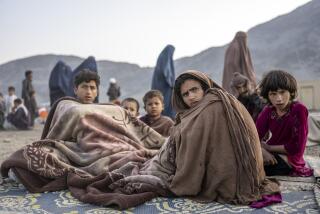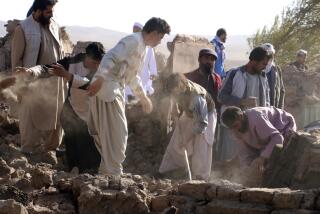India, Afghanistan pledge cooperation
Pakistan may not have had an envoy in the room when Afghan President Hamid Karzai and Indian Prime Minister Manmohan Singh met here Tuesday, but the country’s presence loomed large.
When the two men sat down to talk, most of the issues had a major Pakistan component: terrorism, nation-building, trade, regional stability.
“We will do all within our means to help Afghanistan,” Singh said. “Terrorism is the biggest threat.”
Afghanistan is reeling from the assassination last month of former President Burhanuddin Rabbani, a key figure in the nascent reconciliation and peace process. Afghan security officials say the attack was planned on Pakistani soil.
India is increasingly worried that militancy from Pakistan will also threaten it as a 2014 deadline approaches for North Atlantic Treaty Organization troops to hand over security to Afghans. Fresh in its mind is the 2008 attack on Mumbai planned by militants in Pakistan that killed 166 people.
Afghanistan and India announced a strategic framework on security, trade, education and social ties; preliminary commercial deals on mineral exploration, oil and gas; and enhanced aid.
On other fronts, India agreed to help train Afghan police. And the two leaders discussed ways to improve regional economic cooperation.
This is Karzai’s second visit to India in eight months and follows a trip by Singh to Afghanistan in May.
Analysts said Karzai has placed more weight on ties to India as prospects for rapprochement with the Taliban have foundered and Afghanistan’s relationship with Pakistan has been strained.
“He’s looking for more reliable assistance in the region,” said Ambrish Dhaka, an international relations professor at New Delhi’s Jawaharlal Nehru University. “India has the credentials.”
Some said, however, that India and Afghanistan would be wise to avoid the appearance of ganging up on Pakistan or otherwise alienating their mutual neighbor.
Pakistan remains a hugely influential player in the region, for better or worse, and its cooperation is essential to regional stability, analysts said.
“You can’t do it without Pakistan,” said C. Raja Mohan, senior fellow at New Delhi’s Center for Policy Research, a think tank. “But then the question becomes: What does Pakistan want in Afghanistan? And even then, it’s not what the whole of Pakistan wants, it’s what the army wants.”
Pakistan sees India as its main rival, so closer ties between New Delhi and Kabul could raise hackles in Islamabad.
India and Afghanistan’s hopes for a closer partnership are also limited by geography, despite their shared interests, trust and often jaundiced view of Pakistan’s intentions, analysts said. Pakistan’s location between the two allies means that trade and energy exchanges will be more difficult without Pakistan’s approval.
In addition, after watching the Soviet Union in the 1980s and the U.S. more recently get bogged down militarily in Afghanistan, India is reluctant to take on a greater security role when NATO troops withdraw.
“There’s talk of a strategic partnership, but I wouldn’t give too much to it,” said G. Parthasarathy, an analyst and former Indian ambassador to Pakistan. “India’s strategy has always been to complement what the international community does in Afghanistan, and that will continue. We’re not going to jump into something new.”
India also must grapple with how much risk it’s willing to take even on the softer side. In recent years, its assistance projects, aid workers and its Afghan embassy have come under increasing attack.
The Self-Employed Women’s Assn., an Ahmedabad, India-based civic group helping train Afghan women in embroidery, food processing and other occupational skills, says it’s always aware of the danger of operating in such a difficult security environment.
After February 2010, when two Kabul guest houses popular among aid workers were attacked, killing nine Indians, the Indian government called on aid groups to stay home. Last month, the women’s group sent its first delegation back to Kabul for the first time in 18 months.
The New Delhi-based Sulabh International Social Service Organization, which specializes in sanitation, has followed a similar pattern. Starting in 2005 using Afghan contractors, the group helped build five public toilets in Kabul that use recycled water and bio-gas technology.
On one early visit to Kabul by New Delhi staff, a bomb fell near a project site; no one was hurt. In 2007, the group brought several Afghan engineers to New Delhi for training and they now maintain the system.
“We’re still in touch with Afghan engineers by phone,” said Anita Jha, the group’s senior vice president. “Everything’s held up pretty well. “
As part of his two-day trip, Karzai is to deliver a speech Wednesday at a local foundation on peace efforts in Afghanistan and the national and regional outlook.
More to Read
Start your day right
Sign up for Essential California for news, features and recommendations from the L.A. Times and beyond in your inbox six days a week.
You may occasionally receive promotional content from the Los Angeles Times.





